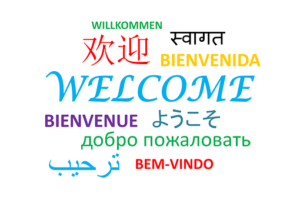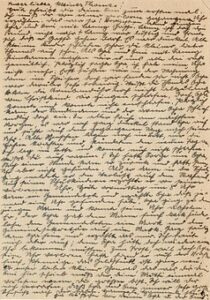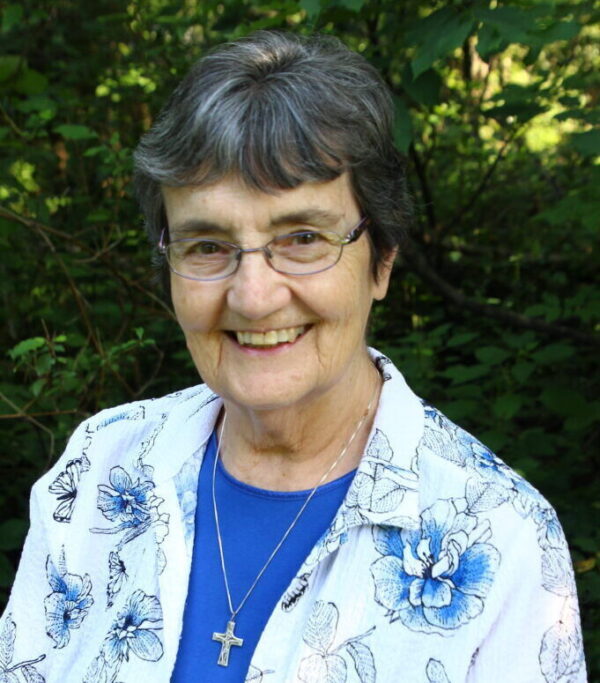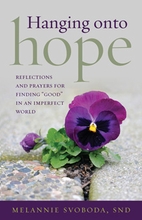Several months ago on this blog, I mentioned that I once taught a course in the history of the English language. One of my readers, Maggie, suggested I write something about the English language. I am following her suggestion.
 First, what is language? Language is a system of sounds (speech), gestures (sign language), or graphic symbols (writing) by which people communicate. Linguists estimate there are roughly 5,000 to 7,000 different languages in the world. The three languages with the most users are (in this order): Chinese, Spanish, and English.
First, what is language? Language is a system of sounds (speech), gestures (sign language), or graphic symbols (writing) by which people communicate. Linguists estimate there are roughly 5,000 to 7,000 different languages in the world. The three languages with the most users are (in this order): Chinese, Spanish, and English.
Language is powerful. It can bestow a group identity. Historically, various groups of people have had a language that so-called outsiders might not understand. Doctors, pilots, educators, gangs, filmmakers, deep-sea divers, farmers, carpenters, teenagers, and even nuns have their own jargon. Accent is interesting too. When I give talks and retreats in the East or South, I sometimes hear from a listener, “I love your Midwest accent.” Of course, I don’t think I have an accent! Language can also indicate “social stratification.” Remember how Eliza in My Fair Lady had to learn the “proper way” to say, “The rain in Spain falls mainly on the plain”?
Language is “a living thing”—unless it is a dead language, that is, a language no one speaks anymore. As such, language is always changing. Here is Matthew 8:20 from three different periods in the history of the English language:
Foxas habbao hol-u and heofonan fuglas nest. (Old English)
Foxis had dennes, and briddis of heuene had nestis. (Middle English)
Foxes have dens, and birds of the heaven have nests. (Modern English)
Remember, these are all English. So, if you were suddenly transported to 14th Century England, you would have a  hard time communicating! The Middle English version shows that hol-u became dennes and fuglas became briddis. Contemporary English still has the words hole, den, and birds. English also has a history of borrowing from other languages. Notice these “English” words: cookie (Dutch), cigar (Spanish) klutz (Yiddish), cartoon (Italian), loot (Hindi), kindergarten (German), karaoke (Japanese), gung-ho (Chinese), and coffee (Arabic.)
hard time communicating! The Middle English version shows that hol-u became dennes and fuglas became briddis. Contemporary English still has the words hole, den, and birds. English also has a history of borrowing from other languages. Notice these “English” words: cookie (Dutch), cigar (Spanish) klutz (Yiddish), cartoon (Italian), loot (Hindi), kindergarten (German), karaoke (Japanese), gung-ho (Chinese), and coffee (Arabic.)
If you live long enough, you become aware of some of the changes in the language you speak. In the word often, the “t” was originally silent. But then speakers began to pronounce the “t.” (Do you?) I imagine some day everyone will be pronouncing the “t.” Do you know the difference between lie (to recline) and lay (to put or place)? You lie down on the bed. You lay your keys on the table. How many people know that “rule” anymore? Just think how science and technology are changing the English language. In recent decades, thousands of new words have come into the language such as astronaut, earthrise, email, CD, google, podcast. And old words have taken on new or expanded meanings: the web, surf, gay, apple, text, cell. I’m wondering what effect text messaging is having on the English language, R U 2?
English, like many languages, is complex and often irrational—especially when it comes to spelling. In 1828 Noah Webster wrote the first dictionary of American English. It took him 26 years—and he first learned 28 languages! Webster tried to standardize the spelling of American English. In doing so, he often simplified spelling  too. So today Americans write color and center while Brits write colour and centre. Some of his changes in spelling, however, never caught on. For island he suggested iland and for tongue, tung. But one of his major contributions was this: he added two letters to our alphabet: j and v. Prior to Webster, these two letters had been listed merely as alternative forms of i and u. (The Latin inscription on the crucifix is INRI–which stands for Jesus of Nazareth Rex (King) of the Jews. Latin has no j.) Webster gave j and v their own sections in his dictionary. (Try singing the alphabet song without j and v.)
too. So today Americans write color and center while Brits write colour and centre. Some of his changes in spelling, however, never caught on. For island he suggested iland and for tongue, tung. But one of his major contributions was this: he added two letters to our alphabet: j and v. Prior to Webster, these two letters had been listed merely as alternative forms of i and u. (The Latin inscription on the crucifix is INRI–which stands for Jesus of Nazareth Rex (King) of the Jews. Latin has no j.) Webster gave j and v their own sections in his dictionary. (Try singing the alphabet song without j and v.)
There’s so much more to say about language. For example, what role do stress, pitch, and juncture play in communicating? Or what about the power of words to heal, hurt, or start wars? And is being “politically correct” really a new thing? Also what about the language of animals? In future blogs, I hope to explore some of these topics.
What have been some of your blessings and struggles with language?
Do you know another language besides your first language? If so, when did you learn it? What was that experience like for you?
When do you most experience the power, beauty, and mystery of language?
Let us conclude this reflection with a short prayer: Ever-communicating God, I thank you for the wonderful gift of language. May I use this precious gift to join together and not divide, to build up and not tear down, to speak truth and not spread falsehoods. May I grow in my ability both to express myself and to listen to others. I ask for these graces through Jesus, the Word of God, and his Amazing Spirit. Amen.
Announcing Our Winners! Last week I promised to give away a copy of my little book, The Lord Is My Shepherd, to one person who responded in any way to last week’s blog, “How Much Can You Say in Six Words.” I had over 150 responses last week—the most ever! So I decided to give away TWO books. (Aren’t I a nice lady?) So I put all the names in a basket and had Sisters John Paul and Sandy (with whom I live) draw the lucky winners. And the winners are…(drum roll please!)… Rita Maglio and Ilene Renshaw! Rita, mother of 9 and grandmother of 19, hails from Merrimack, NH. She and her 5 sisters made a retreat I gave in St. Petersburg, FL a few years back. Ilene is from Pennington, NJ. She and her husband met me several years ago at a retreat I gave in her area. She’s happy to get the book because Ps. 23 was her father’s favorite psalm. So congratulations, Rita and Ilene! An autographed copy of my book is on its way to you! And thanks to all who responded last week with so many six-word gems!
What language do we use to communicate with God? One day the disciples of Jesus asked him to teach them to pray. Jesus proceeded to gave them a few words (Luke’s version has only 38 words in English, Matthew’s version, 52.) These words have become for millions of people the most powerful and meaningful of all prayers. Here is Andre Bocelli’s beautiful version of the Our Father…
Do you have any comment on this reflection or the song? We’d love to see your words below!







24 Responses
Language for me is joy. Agony sometimes but mostly joy.
Dylan Thomas. Who can read him and remain unaffected?
Poetry. Among the living, Mary Oliver, Ted Kooser, my New England Poetry Club workshop mates, and my friend Elena, all have produced language that helps me live.
The language of liturgy. I love going to Mass and hearing languages other than English sometimes. Visiting synagogue and hearing sung Hebrew. Silences between words. The chiseled English of old prayerbooks (e g the 1928 Book of Common Prayer of the Episcopal church).
Social stratification. I used to have a wicked Bawstin accent! I still sound New Englandish, I suppose. But my terminal Rs are more frequent!
I can become obsessive about language. Note my refusal to say “obsessing over”! But I have a friend in his 90s who can be particular about the finer points. “Averse from” is proper, he’ll urge, not “averse to.” And so on.
Yes, language can wound and exclude. It can also heal, bless, thrill, exalt, and unite. And sometimes even do cartwheels and contortions!
Therefore, since brevity….thanks for this post, Sister! Wonderful topic!
My Spanish 101 instructor told us initially that we would love learning
Espanole as it is claro, facil, e logico!! And it was and English is exactly
the opposite of the above!
Thank you, Melannie — a terrific lesson! I never knew that about j and v. Love it! George Benard Shaw, in an effort to illustrate the vagaries of pronunciation in the English language, once asserted fish could spelled “ghoti” by pointing out the f sound in “enough,” the i sound in “women,” and the sh sound in “station,”
Then there’s good old Ben Franklin, who thought the best spelling of wife should be “yf”!
Great blog!
Thank you, Mellannie,! Bocelli’s rendition and the scenery brought me loving peace and gratitude. Language, began with the “WORD” …and the WORD was God…. ooooommmm is about all I can express
I love the song(Love in any Laguage). I was born and raised and taught in French. At 13 I came to US to learn English.
I FEEL in English now, and and think, pray, dream in English. I do remember French and enjoy listening, hearing Italian, Spanish, Portugese, and delight in hearing languages I have no idea they are saying.
Thanks, Melanie! Michelle
Wow! What a great synopsis of the English language! I’m wondering, if “Spanglish” will be coming? A great version of the Lord’s Prayer. Aaron Neville also does a neat version. Both versions give you the “chills”.
Good Morning Sister Melannie,
Wow, such languages we have and how they came to be today.
Andre Bocelli makes The Lord’s Prayer live.
Thank you for all your inspirations each week.
Such a great blog….and so many ways I’d like to respond!
Every Sunday after Mass we stop at a local deli where there is a lovely older Italian lady behind the counter who always gives us cookies and shares her week with us. I have to listen closely and often I don’t understand until we begin to respond to one another. The meaning seems to come in the conversation itself.
That takes me back to the years when we hosted exchange students. They would come with a bilingual dictionary and some ability to converse in writing. By using that dictionary, we quickly learned to communicate in person but were never able to translate it to phone conversations. That experience made me realize the importance of eye to eye contact in understanding one another.
Just living in Florida has made me pretty proficient in reading and understanding simple Spanish. However, I think in English so conversing is beyond me. I found the same problem exists in music. I can play the guitar but I think in piano!
By the way, I love Andrea Bocelli! Thank you!
I like try to figure out what is being written or said by those speaking in other languages or accents. It’s a gift to read. I am a reader at mass. To convey the word of God through reading, not explaining, but with voice and expression. I pray to the Holy Spirit to convey the meaning of the words and the lesson.
Thank you for the gift of your words. This is my first time receiving your seeds.
I ran into trouble with the written word years ago on AOL Instant Messenger. In the days before emojis (another new word for Webster!), joking or sarcasm couldn’t be “seen”. I was regularly misunderstood!
Hello, Sr. Melanie, I also think that languages are so interesting. I worked as a medical transcriptionist for many years and drew from the Latin so often, which medically was a universal language.
Now I have a beautiful daughter-in-law from China and two sweet grandchildren, two and six, who are learning some Mandarin Chinese along with English. For a time, they also had a Nanny who spoke Spanish, so multiple languages were heard and spoken. My granddaughter has her favorite blanket which she calls her “ten ten” in Chinese, but she likes to have a drink of “agua” too. Of course at two, one of her favorite English words is “mine”. It is amazing how all of these languages evolved, and always good for us to learn. Perhaps it is God’s way of bringing the world to each of us. Thank you for your blogs, Sr. Melanie, they make us think and appreciate one another. God bless you and the good work you do!
beautiful comments Meg. you are a master of language too and your beautiful grands are experiencing our global community. so beautiful.
Sister Melanie, thank you I so look forward to receiving Sun Flower Seeds each Monday. What a beautiful description of the English language. Andre Bocilli rendition of the Lord’s Prayer sends chills up my arms. Beautiful!
Sister Melanie, today was an exceptional blog. I am also concerned about the r u 2 in texting. Fortunately my children will not let my grandchildren fall into this trap. I can’t wait for the language of animals.
Your topic this week reminds me of the chuckle I had over over the comic strip where the old fella says to his dog,”Isn’t Ma silly? She jabbers to that cat as if it understands what she’s talking about.”
I am intrigued by how important tone and inflection adds to the meaning and intent of one’s message.
Meanwhile, the most loving one word ever spoken was “Mary!” Jn 20:16
Andre proves you don’t need sight to sing beauty. Loved it!
Sister Melannie, your blog ties right in with something I have been reflecting upon for the last week: the word “WITH”. As in “Hail Mary, full of grace, the Lord is WITH thee”. Of all the other verbs choices out there – guiding, counselling, helping, teaching, encouraging, uplifting, advising, admonishing, loving, etc, etc – somehow the word “WITH” embodies all of them and so much more! What does it really mean to be “with” someone? That is something I want to explore in this New Year. Thank you!
Dear Sister Melanie,
I too, love your weekly words of wisdom. They are that you know. Each week, your words open my heart and mind to new, fresh meanings…to clarity where I have mistakenly settled with my own interpretation as being closer to the correct one! Ahhh, ego.
Simply….. thank you, and I do so look forward to more. Fascinating….history of any kind…especially languages and the people who lived them.
Pld
Thank you for sharing your blog and Andre Bocelli!!
We only need to listen to political discourse these days to realize we have serious problems with what words mean to different people!
If only we could use words to build up rather than tear down!
thank you sister – so interesting – I learned so much! And the comments are so rich as well. Thank you for sharing each week and keeping us engaged and aware of God’s presence and the power of words. “First there was the word… and the word dwelt among us.”
Thank you, Sister Melanie, for responding to my request and writing about the English language. I’m, too, mesmerized with words and when I see them used creatively in a piece of writing, I have to copy the particular sentence or paragraph.
English is my second language – I have fallen in love with it many years ago.
Beautiful Message!!! And Andre is truly Heaven Sent….
Always appreciate your Wisdom and thoughts, Dear Melanie.
God’s Blessings to you!!
Rosey ☘️
Oh the power and the glory! What an awesome God….